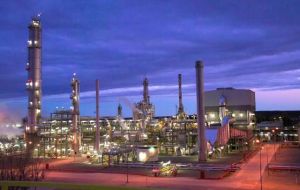MercoPress. South Atlantic News Agency
Argentina bans fuel exports and calls for pump price rollback
 Repsol plant in Neuquen, Patagonia
Repsol plant in Neuquen, Patagonia Argentina halted fuel exports and called for a pump price rollback on Monday amid reports of fuel shortages, government news agency Telam reported, citing unidentified government sources.
The government officials said the export freeze, which follows a sharp increase in export taxes in November, was authorized under a 1974 supply law that requires companies to meet internal demand, Telam reported. The export freeze will remain in effect until supplies at service stations normalize and prices fall back, Telam said. The decision was taken following complaints about a lack of fuel supplies from some service station operators. In addition to cutting off fuel exports, government planners also have called for retailers to drop pump prices back to levels seen in October of last year. Argentine pump prices are among the lowest in the region due to government pressure that began under President Nestor Kirchner. It was expected that with the new president, Cristina Fernandez, prices would be allowed to rise given the fact that Argentina faces the prospect of becoming a net oil importer by the end of the decade. Four companies account for about 95% of all refining and fuel sales in Argentina: Repsol-YPF SA (REP), Petroleo Brasileiro SA (PBR), or Petrobras, Royal Dutch Shell PLC (RDSA) and ExxonMobil Corp (XOM). There was no immediate reaction from these companies. Local pump prices had been more or less frozen since March 2005, when Kirchner called for a boycott of stations operated by Shell after the company raised pump prices. The price of premium gasoline had floated around 1.99 pesos (64 US cents) per liter until April of last year, when it began to creep higher. Argentina faces chronic shortages of diesel, especially during key harvest and planting periods, although there is still a surplus of gasoline, which had allowed refiners an opportunity for profit. That margin was pinched in November, however, when the government raised the tax on gasoline and other petroleum derivates from 5% to around 35% in a bid to tame local fuel prices. A tacit agreement between oil companies and the government reached during Argentina's economic meltdown of 2001/02 has kept gasoline and diesel prices below international values. Worried about inflation, the government has resisted energy company calls for price increases. But service stations taking advantage of shortages have raised fuel prices in recent months in some parts of the country.




Top Comments
Disclaimer & comment rulesCommenting for this story is now closed.
If you have a Facebook account, become a fan and comment on our Facebook Page!